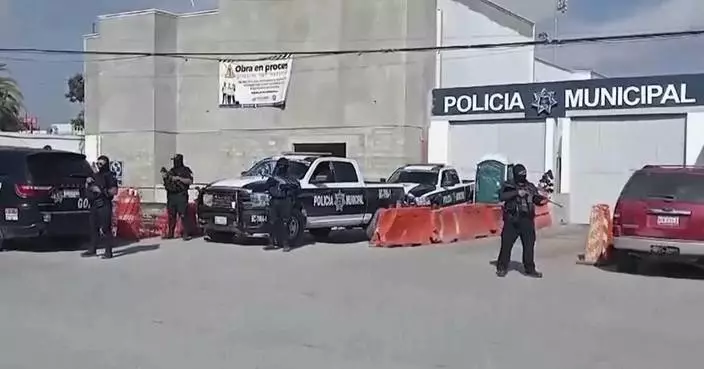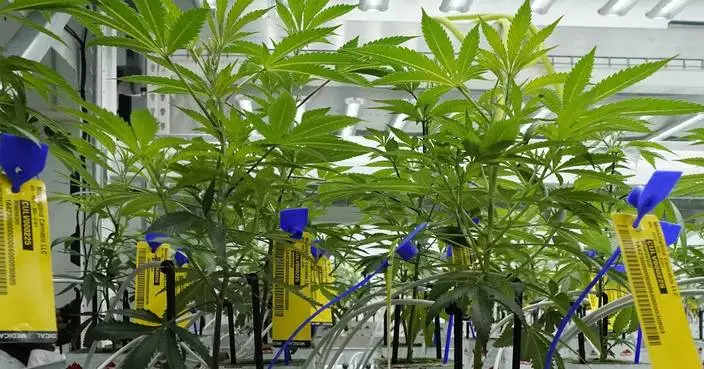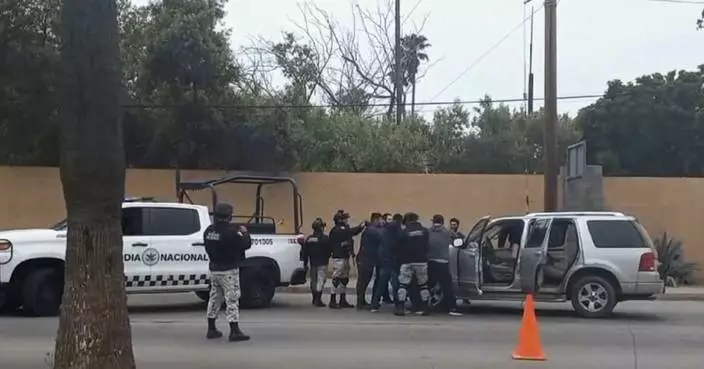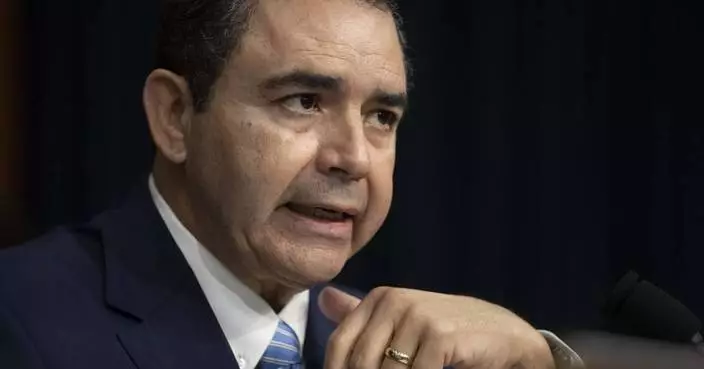Wildlife rangers said Tuesday that they had trapped a 4.7-meter (15-foot) saltwater crocodile, the largest they had ever caught in the northern Australian Katherine River and in an upstream region popular with tourists that is thought relatively safe from the killer predators.
Northern Territory Parks and Wildlife said it had trapped the 600-kilogram (1,300-pound) reptile on Monday more than 300 kilometers (185 miles) from the ocean and only 30 kilometers (19 miles) downstream from Katherine Gorge, a major tourist attraction outside the Northern Territory town of Katherine.
Tourists swim, canoe and take cruises in the gorge among freshwater crocodiles, a different species that are small, timid and rarely harm humans. Mid-year is the peak tourist season.
Ranger John Burke said authorities had been hunting the large crocodile in the area for a decade.
"We've called it a lot of things over the years because it's been so hard to catch," Burke said.
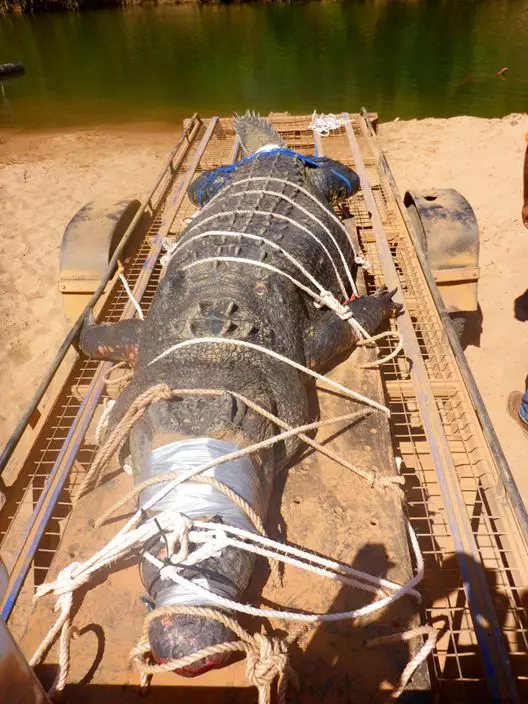
In this Monday, July 9, 2018, photo provided by the Northern Territory Department of Tourism and Culture, a large crocodile is bound on a trailer after it was captured near Katherine, Australia. Northern Territory Parks and Wildlife said in a statement on Tuesday, July 10, 2018, it had trapped the 600-kilogram (1,300-pound) reptile only 30 kilometers (19 miles) downstream from Katherine Gorge, a major tourist attraction outside the Northern Territory town of Katherine. (NT Department of Tourism and Culture via AP)
"On record, this is the biggest saltwater crocodile removed from the Katherine management zone," he added, referring to the part of the river where saltwater crocs, a protected species, are trapped because they're too close to human populations.
Northern Territory-based crocodile expert Grahame Webb said saltwater crocs, also known as estuarine crocodiles, were heading farther upstream into fresh water river systems as their population has boomed since they were protected by federal law in 1971.
While large crocs are territorial, Webb suspected the trapped croc had moved to and from the area where it was caught during the past 10 years. Satellite tracking had shown one croc tagged in a Northern Territory waterhole had swum 900 kilometers (560 miles), for unknown reasons, before returning to the same place.
"That sort of croc, in my opinion, is the most dangerous to people," Webb said. "In areas where they're at best low densities, someone won't have seen one for a long, long time and they think they're safe and they're not necessarily safe."
Webb said the capture so close to tourists demonstrated that the government protection program worked.
"It's worrying, but it's good that they've got an active program and they've got active traps," Webb said.
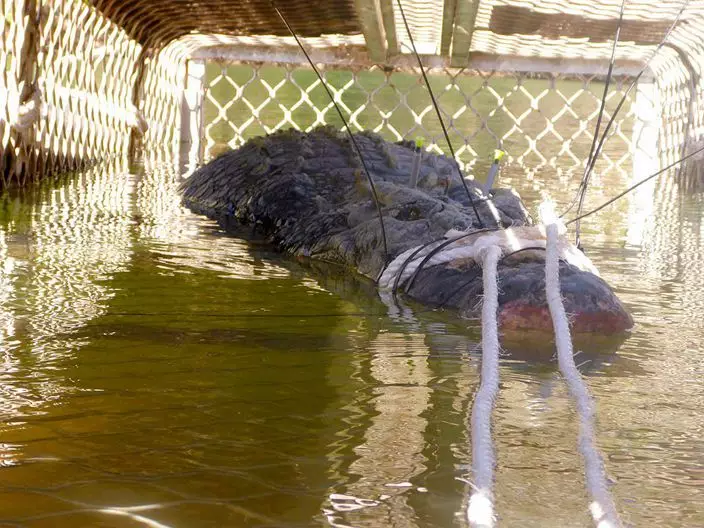
In this Monday, July 9, 2018, photo provided by the Northern Territory Department of Tourism and Culture, a large crocodile is captured in a trap near Katherine, Australia. Northern Territory Parks and Wildlife said in a statement on Tuesday, July 10, 2018, it had trapped the 600-kilogram (1,300-pound) reptile only 30 kilometers (19 miles) downstream from Katherine Gorge, a major tourist attraction outside the Northern Territory town of Katherine. (NT Department of Tourism and Culture via AP)
The croc has been trucked to a crocodile farm outside Kathrine where it's likely to become a tourist attraction. Crocodiles are farmed for their meat and hides, but large and battle-scarred crocs are usually unsuitable for the handbag market.
Since crocodiles became a protected species, crocodile numbers in the Northern Territory have exploded from 3,000 to an estimated 80,000 to 100,000.
Because saltwater crocodiles can live up 70 years and grow throughout their lives, reaching up to 7 meters (23 feet), the proportion of large crocodiles is also rising.
MEXICO CITY (AP) — Two Australians and an American were doing what they loved on the stunning, largely isolated stretch of Baja California's Pacific coast. Their last images on social media showed them sitting and gazing at the waves, contemplating the breaks.
What happened to end their lives may have been as random as a passing pickup truck full of people with ill intent. The surfers were shot in the head, their bodies dumped in a covered well miles away. How it unfolded was the stuff of nightmares.
Brothers Jake and Callum Robinson from Australia and American Jack Carter Rhoad had apparently stopped to surf the breaks between Punta San José, about 50 miles (80 kilometers) south of Ensenada, and La Bocana, further north on the coast. They were attacked there on April 28 or 29.
As soon as police arrived at their last known camp site, it was clear that something had gone violently wrong.
There were bloodstains and marks “as if heavy objects had been dragged," leading to suspicions of an attack, the Baja California state prosecutor's office said in an attempt to reconstruct the scene.
Chief state prosecutor María Elena Andrade Ramírez described what likely would have been moments of terror that ended the trip for the three men.
She theorized the killers drove by and saw the foreigners’ pickup truck and tents and wanted to steal the truck's tires and other parts. But “when (the foreigners) came up and caught them, surely, they resisted.”
She said that’s when the killers would have shot the men. She said they were likely not attacked because they were tourists. "The evidence suggests they (the killers) did not know where they were from.”
Andrade Ramírez said the reconstruction of events was based on the forensic examiner's reports, noting all three had bullet wounds to the head.
There was a hurried attempt to destroy evidence. The foreigners’ tents were apparently burned. The pickup truck was driven miles away and burned. The assailants' truck was later found with a gun inside.
Then, at “a site that is extremely hard to get to,” the bodies were dumped into a well about 4 miles (6 kilometers) away. Investigators were surprised when, underneath the bodies of the three foreigners, a fourth body was found that had been there much longer.
"They had to have previous knowledge of it," Andrade Ramírez said of the attackers, acknowledging the possibility they were behind the previous killing.
The well had been covered with boards. “It was literally almost impossible to find it,” Andrade Ramírez said. It took two hours to winch the bodies out.
Prosecutors have said they were questioning three people in the killings. Two were caught with methamphetamines. One of them, a woman, had one of the victims' cellphones when she was caught. Prosecutors said the two were being held pending drug charges but continue to be suspects in the killings.
A third man was arrested on charges of a crime equivalent to kidnapping, but that was before the bodies were found. It was unclear if he might face more charges.
The third man was believed to have directly participated in the killings. In keeping with Mexican law, prosecutors identified him by his first name, Jesús Gerardo, alias “el Kekas,” a slang word that means quesadillas, or cheese tortillas.
Andrade Ramírez said he had a criminal record that included drug dealing, vehicle theft and domestic violence, adding, “We are certain that more people were involved.”
She emphasized that she could not discuss anything related to the suspects, or their possible statements, because that was not allowed under Mexican law and might prejudice the case against them.
Andrade Ramírez noted that the victims' families said the brothers and Rhoad had come many times to the seaside spot and never had any problem. This time, however, "there was no way to ask for help when the attackers showed up.”
Australian Prime Minister Anthony Albanese said on Tuesday he had requested an opportunity to speak to the brothers’ parents Deborah and Martin Robinson.
“This is a terrible tragedy and my heart goes out to them. To identify these wonderful young men and they have been travelling in Mexico. We’ve been dealing with them through the Department of Foreign Affairs and Trade. I’ve indicated that I wish to speak to them at an appropriate time of their choosing,” Albanese told reporters in the Queensland state town of Rockhampton.
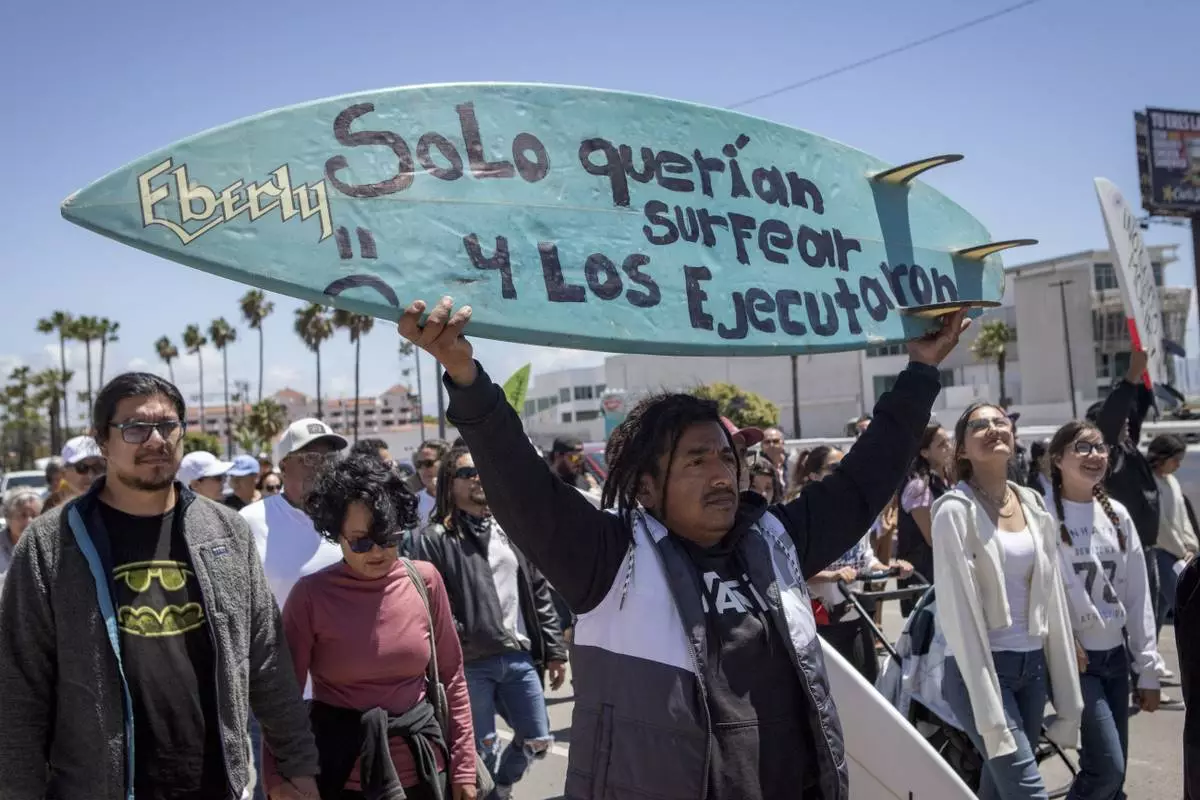
A demonstrator holding a bodyboard written in Spanish " They just wanted to surf and they were executed" protests the disappearance of foreign surfers in Ensenada, Mexico, Sunday, May 5, 2024. Mexican authorities said Friday that three bodies were recovered in an area of Baja California near where two Australians and an American went missing last weekend during an apparent camping and surfing trip. (AP Photo/Karen Castaneda)
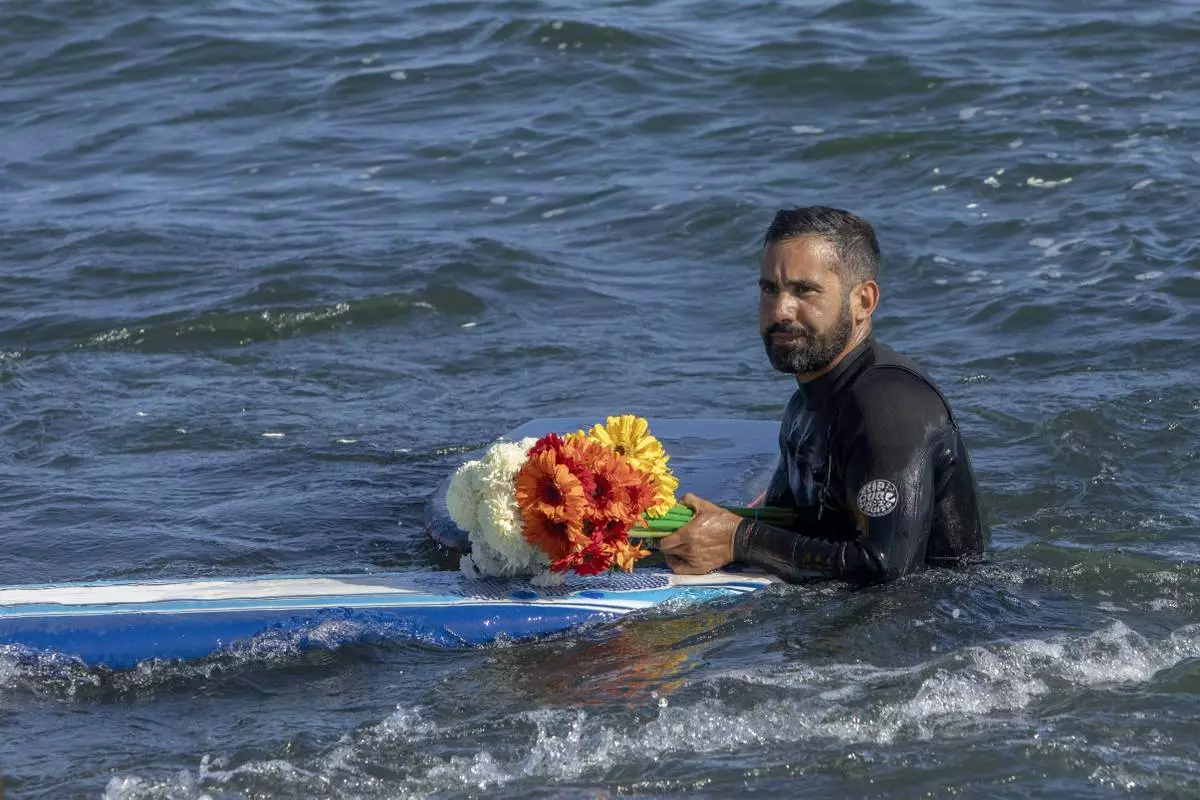
A man holds flowers during a tribute to 3 missing surfers in Ensenada, Mexico, Sunday, May 5, 2024. Mexican authorities said Friday that three bodies were recovered in an area of Baja California near where two Australians and an American went missing last weekend during an apparent camping and surfing trip. (AP Photo/Karen Castaneda)
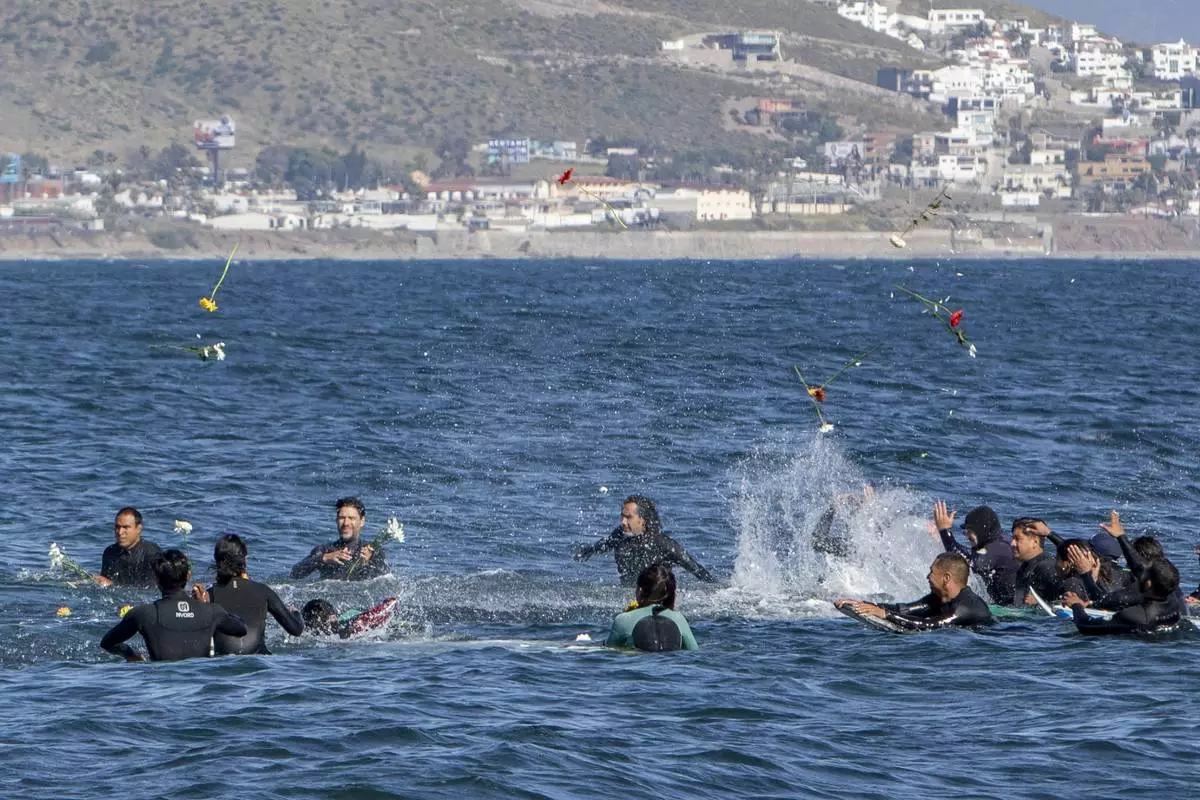
Surfers throw flowers during a tribute to 3 missing surfers in Ensenada, Mexico, Sunday, May 5, 2024. Mexican authorities said Friday that three bodies were recovered in an area of Baja California near where two Australians and an American went missing last weekend during an apparent camping and surfing trip. (AP Photo/Karen Castaneda)
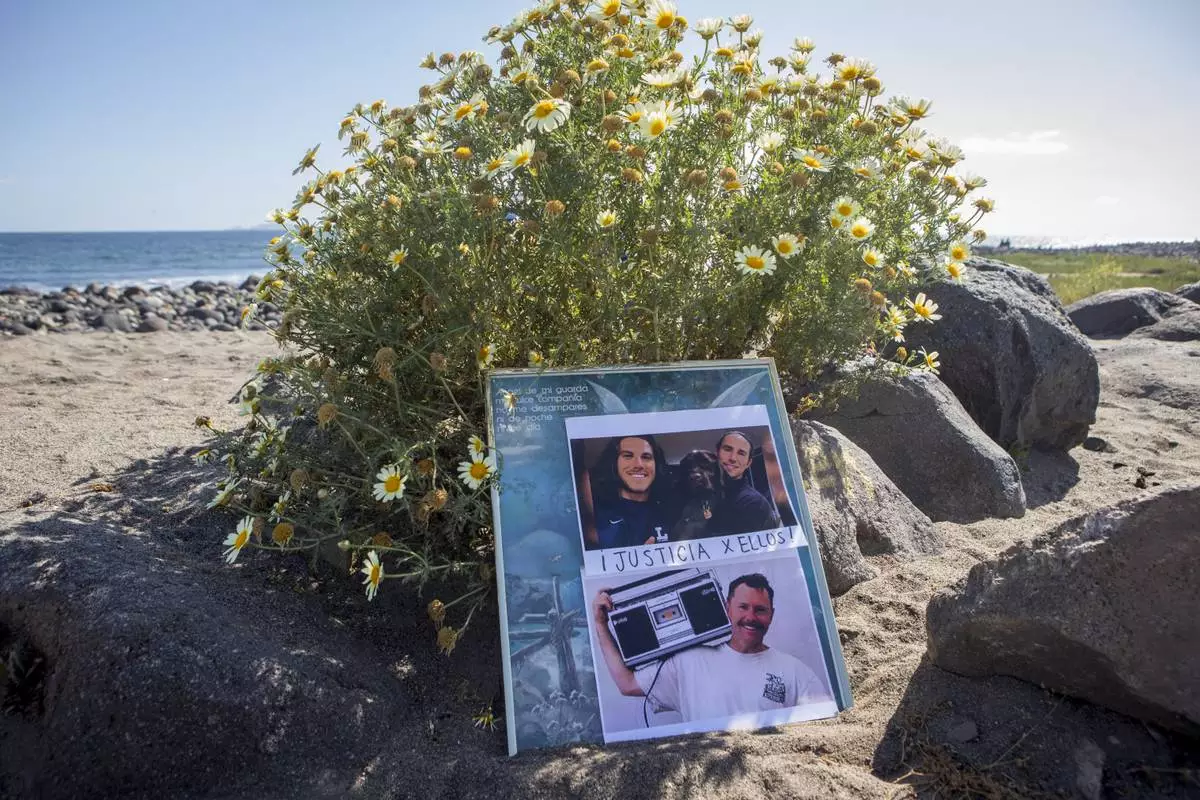
The photos of the foreign surfers who disappeared are placed on the beach in Ensenada, Mexico, Sunday, May 5, 2024. Mexican authorities said Friday that three bodies were recovered in an area of Baja California near where two Australians and an American went missing last weekend during an apparent camping and surfing trip. (AP Photo/Karen Castaneda)










